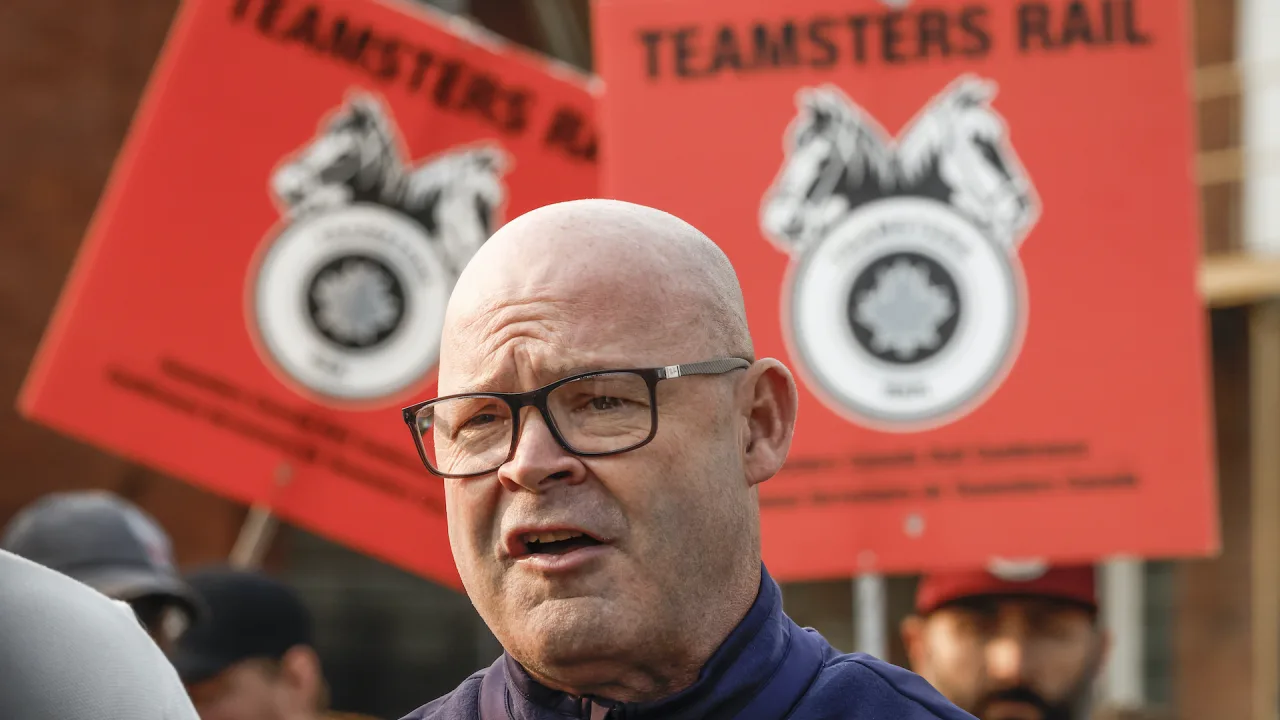Teamsters union won’t endorse Harris or Trump in presidential race
The International Brotherhood of Teamsters declined Wednesday to endorse Kamala Harris or Donald Trump for president, saying neither candidate had sufficient support from the 1.3 million-member union. “Unfortunately, neither major candidate was able to make serious commitments to our union to ensure the interests of working people are always put before Big Business,” Teamsters president Sean M. O’Brien said in a statement. “We sought commitments from both Trump and Harris not to interfere in critical union campaigns or core Teamsters industries—and to honor our members’ right to strike—but were unable to secure those pledges.” Vice President Harris met Monday with a panel of Teamsters, having long courted organized labor and made support for the middle class her central policy goal. Trump also met with a panel of Teamsters and even invited O’Brien to speak at the Republican National Convention, where the union leader railed against corporate greed. The Teamsters said Wednesday that internal polling of its members showed Trump with an advantage over Harris. The Teamsters’s choice to not endorse came just weeks ahead of the November 5 election, far later than endorsements by other large unions such as the AFL-CIO, the American Federation of Teachers, and the United Auto Workers that have chosen to back Harris. The Teamsters detailed their objections to the candidates in a statement, starting with their objection to a contract implemented by Congress in 2022 on members working in the railroad sector. The union wanted both candidates to commit to not deploying the Railway Labor Act, to resolve contract disputes, and avoid a shutdown of national infrastructure, but Harris and Trump both wanted to keep that option open even though the Teamsters said it would reduce its bargaining power. Harris has pledged to sign the PRO Act, which would strengthen union protections and is something the Teamsters support. She also criticized states that enact laws making it more difficult to unionize. Trump, in his January roundtable with the Teamsters, did not promise to veto a proposal to make it harder nationwide to unionize. Other unions have shown trepidation about offering an endorsement for one of the two presidential candidates. The United Electrical, Radio & Machine Workers of America on Friday ultimately endorsed Harris with a caveat that “the manner in which party leaders engineered Biden’s replacement at the top of the ticket with Vice President Kamala Harris was thoroughly undemocratic,” union leadership said in a statement. But the Teamsters lack of endorsement also suggests an indifference to the Biden-Harris administration, which signed into law a measure that saved the pensions of millions of union retirees, including many in the Teamsters. As part of its 2021 pandemic aid, the administration included the Butch Lewis Act to save the underfunded pensions of more than 1 million union workers and retirees’ underfunded pensions. The act was named after a retired Ohio trucker and Teamsters union leader who spent the last years of his life fighting to prevent massive cuts to the Teamsters’s Central States Pension Fund. —Josh Boak and Tom Krisher, Associated Press Fatima Hussein contributed to this report.

The International Brotherhood of Teamsters declined Wednesday to endorse Kamala Harris or Donald Trump for president, saying neither candidate had sufficient support from the 1.3 million-member union.
“Unfortunately, neither major candidate was able to make serious commitments to our union to ensure the interests of working people are always put before Big Business,” Teamsters president Sean M. O’Brien said in a statement. “We sought commitments from both Trump and Harris not to interfere in critical union campaigns or core Teamsters industries—and to honor our members’ right to strike—but were unable to secure those pledges.”
Vice President Harris met Monday with a panel of Teamsters, having long courted organized labor and made support for the middle class her central policy goal. Trump also met with a panel of Teamsters and even invited O’Brien to speak at the Republican National Convention, where the union leader railed against corporate greed.
The Teamsters said Wednesday that internal polling of its members showed Trump with an advantage over Harris.
The Teamsters’s choice to not endorse came just weeks ahead of the November 5 election, far later than endorsements by other large unions such as the AFL-CIO, the American Federation of Teachers, and the United Auto Workers that have chosen to back Harris.
The Teamsters detailed their objections to the candidates in a statement, starting with their objection to a contract implemented by Congress in 2022 on members working in the railroad sector.
The union wanted both candidates to commit to not deploying the Railway Labor Act, to resolve contract disputes, and avoid a shutdown of national infrastructure, but Harris and Trump both wanted to keep that option open even though the Teamsters said it would reduce its bargaining power.
Harris has pledged to sign the PRO Act, which would strengthen union protections and is something the Teamsters support. She also criticized states that enact laws making it more difficult to unionize. Trump, in his January roundtable with the Teamsters, did not promise to veto a proposal to make it harder nationwide to unionize.
Other unions have shown trepidation about offering an endorsement for one of the two presidential candidates. The United Electrical, Radio & Machine Workers of America on Friday ultimately endorsed Harris with a caveat that “the manner in which party leaders engineered Biden’s replacement at the top of the ticket with Vice President Kamala Harris was thoroughly undemocratic,” union leadership said in a statement.
But the Teamsters lack of endorsement also suggests an indifference to the Biden-Harris administration, which signed into law a measure that saved the pensions of millions of union retirees, including many in the Teamsters.
As part of its 2021 pandemic aid, the administration included the Butch Lewis Act to save the underfunded pensions of more than 1 million union workers and retirees’ underfunded pensions. The act was named after a retired Ohio trucker and Teamsters union leader who spent the last years of his life fighting to prevent massive cuts to the Teamsters’s Central States Pension Fund.
—Josh Boak and Tom Krisher, Associated Press
Fatima Hussein contributed to this report.






















